Physical Address
304 North Cardinal St.
Dorchester Center, MA 02124
Physical Address
304 North Cardinal St.
Dorchester Center, MA 02124

Avoid overpacking these common camping items that experienced outdoorsmen know you don't actually need for a successful wilderness adventure.
When you’re planning your next camping trip, you’ll face the temptation to pack every gadget and comfort item that catches your eye. But loading up on nonessential gear won’t just strain your budget—it’ll weigh down your pack and complicate what should be a simple outdoor experience. Before you stock up on fancy cooking equipment or the latest camping gizmos, consider what you truly need to enjoy nature’s simplicity. Let’s explore which items you can confidently leave behind.
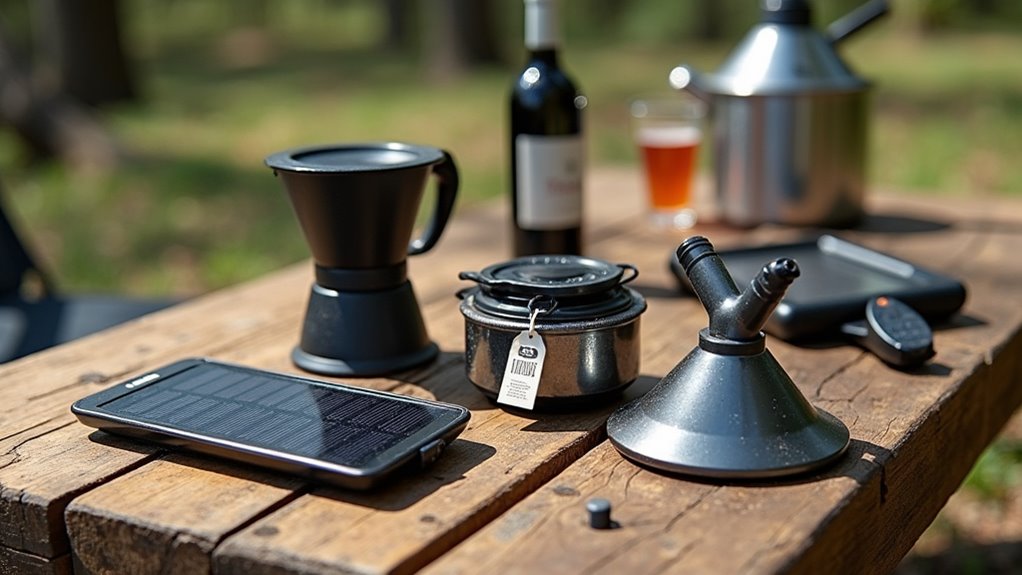
Why do campers often fall for expensive gadgets that promise revolutionary outdoor experiences? The appeal of novelty and convenience can lead you to invest in overpriced gear that you’ll rarely use.
Items like LED marshmallow roasters, multi-function sporks, or the Scrubba Wash Bag might seem innovative but often don’t justify their high cost. The SwissChamp XAVT, with its hefty $370 price tag, exemplifies how specialized tools can be more about impressing others than meeting practical needs.
Trendy camping gadgets promise innovation but deliver minimal value, becoming expensive dust collectors in your gear closet.
These gadgets typically underdeliver on their promises while adding unnecessary weight and complexity to your pack. You’ll find that many high-tech camping tools require batteries, extensive setup, or create unwanted noise and light pollution. Debunking common camping myths can help you avoid falling for these marketing gimmicks.
Instead of falling for marketing hype, stick to reliable, traditional gear that serves multiple purposes. Remember, successful camping depends more on practical knowledge and basic equipment than on fancy gadgets that might fail when you need them most.
Much like those enticing gadgets, specialty cleaning equipment for camping often promises more than it delivers.
Battery-powered pressure washers, mobile cleaners with integrated tanks, and specialized brushes might seem appealing, but they’re unnecessary expenses that add weight and complexity to your camping setup. Well-cared-for gear promotes sustainability by reducing the need for frequent replacements and minimizing waste.
You’ll find that regular sponges, basic brushes, and a bucket of water are more than adequate for most camping cleanup tasks. Essential camping storage solutions can help you maximize the use of these simple cleaning tools.
These simple tools are lightweight, cost-effective, and align perfectly with Leave No Trace principles. They don’t require power sources, maintenance, or special storage considerations.
While specialized cleaning gear might make sense for professional outfitters or permanent campsites, it’s overkill for typical camping trips. Save your money and space by sticking to basic cleaning supplies you likely already have at home.
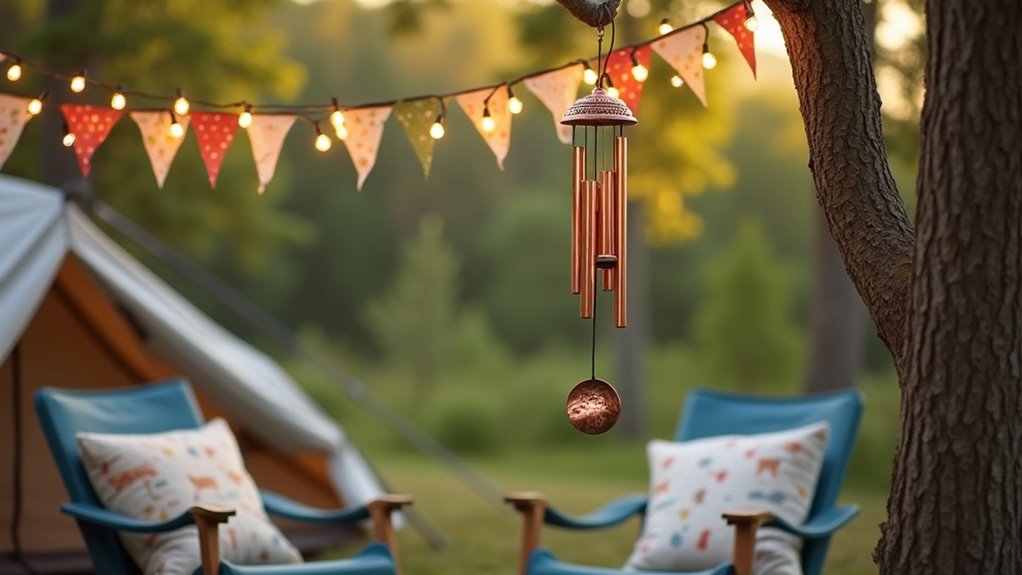
While decorative campsite accessories can transform an ordinary campsite into an Instagram-worthy outdoor retreat, they’re largely unnecessary for a successful camping experience. Embrace Responsible Camping for a greener experience.
Items like Moroccan lanterns, decorative throw pillows, and handmade signs from Etsy might look great in photos, but they’ll only add weight to your pack and complexity to your setup.
Instead of investing in specialty lighting, streamers, and outdoor rugs, focus on essential camping gear that serves practical purposes.
If you want to enhance your campsite’s ambiance, you can use natural elements like foraged foliage or driftwood that you’ll find on-site. A simple stained glass nightlight can provide both practical illumination and subtle decoration without excessive bulk.
While gourmet indulgences and fancy textiles might create a luxurious atmosphere, remember that camping is about connecting with nature, not recreating your living room outdoors.
Just as decorative accessories can weigh down your camping experience, an overcrowded camp kitchen can turn meal prep into an unnecessary hassle.
You’ll find that most camping meals only require one or two pots and a single pan, making excessive cookware a burden that wastes space and cleaning resources. Camp cooking essentials can help streamline your kitchen setup.
Skip the electric gadgets like blenders and coffee makers that depend on unreliable power sources. Instead, opt for multi-use utensils and a good knife that can handle various tasks.
Focus on essential ingredients like salt and pepper and basic spices to keep your meal prep simple while still creating delicious camp food.
You don’t need multiple mixing bowls, measuring cups, or prep containers either – one of each will do.
When it comes to cleaning supplies, a single sponge and small soap bottle are sufficient.
Replace heavy ceramic dishes with lightweight alternatives, and you’ll discover that a minimalist kitchen setup makes your camping experience more enjoyable and efficient.
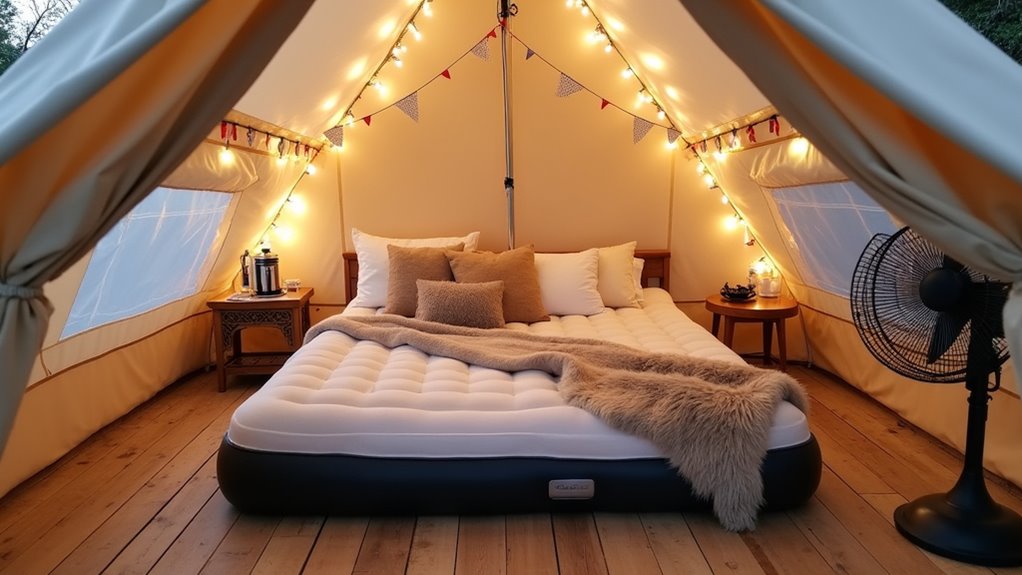
Personal comfort items often become the biggest source of unnecessary weight in camping gear. While comfort is important, you don’t need to pack every luxury item available.
Skip elaborate inflatable sleep systems with battery-powered pumps and opt for a basic sleeping pad instead. Reclining camp chairs, though comfortable, can be replaced with simple camp stools or even a seat pad.
You can also forgo items like portable fans, USB-charging lanterns, and camping hammocks. Instead of multiple hygiene products, pack just the essentials: biodegradable wipes and basic toiletries. Experienced campers find that biodegradable soap is sufficient for both personal washing and dishwashing needs.
Rather than specialized camping slippers and hiking sandals, one pair of comfortable camp shoes will suffice. Remember, your backpack gets heavier with each comfort item you add, and most experienced campers find they need far less than they initially think.
Novelty camping gear often tempts outdoor enthusiasts with its unique designs and entertaining features. However, you’ll find these items typically prioritize amusement over practicality, with inflated prices that don’t match their utility.
Consider wearable sleeping bags like the Musuc Bag ($100-$340) or decorative solar string lights – they’re fun but unnecessary additions that add weight to your pack. Storing your equipment in clear labeled bins helps maintain organization much better than fancy storage solutions.
Hanging camp cupboards ($70) and colored fire starters ($1.79) might enhance your campsite’s appearance, but they’re not worth the extra bulk or expense. Unnecessary camping gear can often distract from building a practical camping kit that focuses on safety, functionality, and genuine outdoor needs.
While comfort items like water-resistant slippers and quick-dry towels can make camping more enjoyable, you’re better off investing in essential gear first.
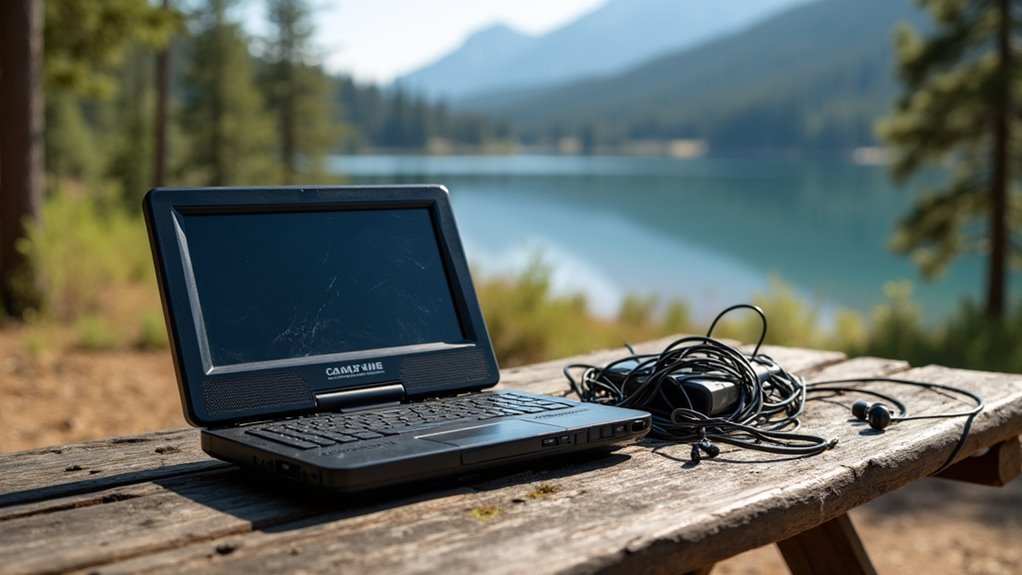
While technology has become increasingly portable, carrying bulky entertainment devices like tablets, laptops, and portable TVs on camping trips can detract from the outdoor experience and drain your budget.
Recent trends show that campers are actually moving away from relying on Wi-Fi and entertainment devices, with internet needs dropping from 37% to 29% since 2017.
You’ll find that camping offers a perfect opportunity for a digital detox, letting you reconnect with nature and embrace simpler forms of entertainment. Instead of lugging around heavy devices, you can engage in outdoor activities, play cards, or tell stories around the campfire.
With outdoor recreation contributing 37.4% of the total value added to the industry in the U.S. in 2020, it’s clear that traditional outdoor activities remain highly valued.
Though 97% of campers still bring some technology, it’s mainly for safety and basic communication. Essential camping hacks can enhance your next adventure by helping you pack light and focus on the great outdoors.
Much like the trend away from digital devices, many campers overpack complex sanitation solutions that weigh down their gear and drain their wallets. You don’t need portable showers, full-size toiletry kits, or elaborate waste disposal systems for most camping trips. Essential first aid kits can provide important supplies for wilderness emergencies.
Instead, opt for simple, lightweight alternatives. Pack travel-size toiletries and multi-use biodegradable soap for washing. Body wipes or baby wipes can effectively substitute for daily showers while camping. A quick-dry towel and wet wipes will keep you clean enough, while hand sanitizer handles most hygiene needs.
If you’re at established campsites, skip the specialized trowels – you’ll have access to proper facilities. For backcountry camping, basic disposal methods like double-bagged waste and a simple trowel work just fine.
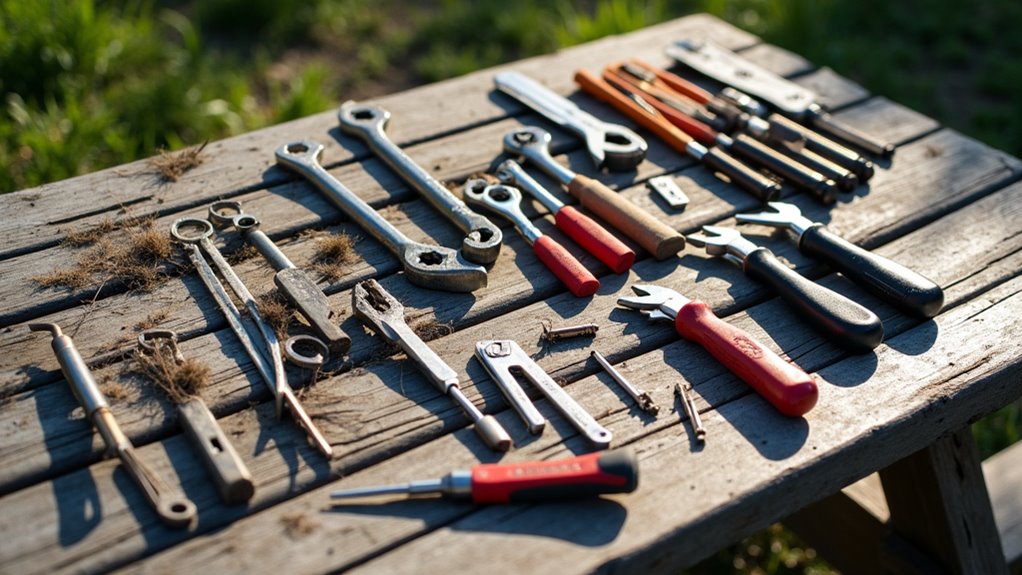
As campers seek to prepare for every possible scenario, they often overload their packs with unnecessary repair tools and backup equipment. You don’t need specialized repair kits for every piece of gear you own. A simple multi-tool, duct tape, and basic sewing supplies can handle most field repairs. A Victorinox Classic knife is perfectly adequate for most camping trips.
Skip the full-size axes, heavy mallets, and complex stove repair kits – they’re overkill for typical camping trips. You’ll rarely use specialized items like tent pole repair sleeves or multiple types of cordage. Essential tips for first-time campers can help guide your packing decisions.
Instead of carrying redundant adhesives, backup tools, and duplicate repair supplies, focus on bringing versatile items that serve multiple purposes. For most trips, you can trust quality gear and basic repair skills rather than lugging around extensive toolkits designed for extended expeditions.
You’ll find that ditching nonessential camping gear lightens your load and enriches your outdoor experience. Studies show that the average camper carries 35% more equipment than they actually use during a typical weekend trip. By focusing on versatile basics and eliminating unnecessary gadgets, you’ll save money, reduce pack weight, and reconnect with nature’s simplicity. Remember, the best camping memories come from experiences, not excess equipment.